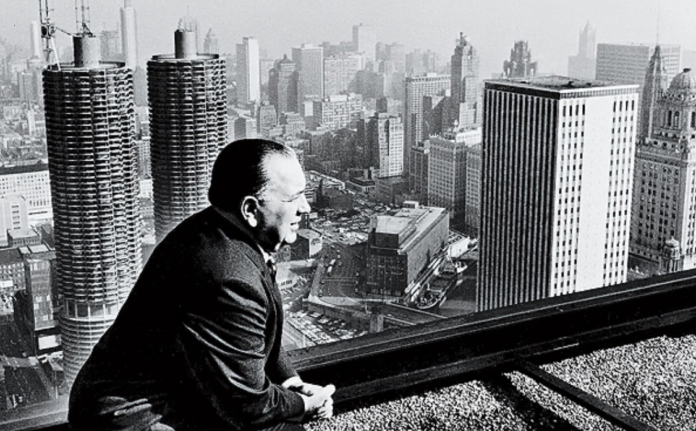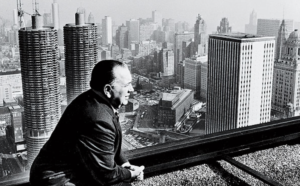

Hyde Park and neighboring Kenwood had been no better than other Chicago neighborhoods in the early part of the 1900s. Like so many other Chicago communities, they’d sought to exclude black residents. But Hyde Park became resoundingly integrated and has stayed that way. And looking at the sweep of Twentieth Century politics in Chicago, it could be argued that Hyde Park was the wellspring of another important ideal. That the governance of one of the nation’s most thoroughly corrupt cities should not be allowed to stay that way.
Hyde Park was the moral fiber in Chicago Politics. We tried, anyway.
The special line of succession for Hyde Parkers in 20th Century Chicago politics began in earnest with alderman and mayoral candidate Charles Merriam. For Merriam, William Hale “Big Bill” Thompson served as a sort of toreador’s red handkerchief being waved madly about. From 1915 to 1923 and from 1927 to 1931 Thompson was the Mayor of Chicago.
The last Republican chief executive of the city, Big Bill Thompson was a populist demagogue who scored big points railing against the media and big corporations. He had a well-developed political machine and believed in the healing power of graft.
The Mayor’s Well-Stocked Booze Train To Cheyenne
Gary Krist’s marvelous Chicago historical portrait City of Scoundrels details how Thompson marched to his own beat. As racial violence escalated in the summer of 1919 and a crippling transit strike loomed, he nonetheless hewed to an earlier invitation he’d accepted to be an honored guest at Frontier Roundup Days in Cheyenne, Wyoming. With a contingent of one hundred-plus Chicago Boosters Club members he left the city in a special train well-stocked with liquid refreshment for a few days of Western-themed frolicking.
Big Bill often talked a great game to Chicago’s growing black population and won their votes. But some black community leaders noticed he and his police did little to prevent brutal racist attacks upon them. In his later years as Mayor, Thompson became well-known for his close association with Al Capone, as Prohibition created new and rich opportunities for organized crime in Chicago.
Thomson also championed a grand public works program that eventually resulted in a jeweled string of city parks and grand boulevards designed by Frederick Law Olmstead and Daniel Burnham. That helps define the city to this day. It was riven with corruption but the outcomes were brilliant. This is Chicago, after all. We could call it a win.
And just wink at the corruption. That’s still usually what happens, after the politicians shuffle off to jail, and the headlines wind down. Their replacements are waiting in the wings. Here’s a sobering thought: local corruption experts note for every one grifter caught, about ten more evade detection.
But it the ethos was not so sanguine in 1919. As the mayoral contest began to unfold, one of Thompson’s challengers in the Republican primary election was the alderman from Hyde Park, Merriam. Almost twenty years prior Merriam had become the first political science faculty member at the University of Chicago. He codified the modern field of political science. He wrote books which helped form the basis for the American Progressive movement. His collected papers are extensive.
Merriam chaired the precursor of the university’s business school. He served on city commissions to formulate best practices on spending, harbors, and waste management.
Buffaloed By Big Bill
Merriam ran for and was almost elected mayor in 1911. But in 1919 his Republican primary campaign was buffaloed by Thompson’s freewheeling maneuvering and rhetoric. Thompson went on to defeat a field of Democrats in the general election.
Some years later, Merriam’s son Robert had himself become a distinguished Chicagoan. An army captain, historical novelist, public policy theorist and author, he had a Master’s degree from the University of Chicago and served as alderman for Hyde Park from 1947 to 1955.
A long-time reform Democrat, he switched to the Republican Party in 1955 to run for Mayor of Chicago.
His opponent was a Democratic insider named Richard J. Daley, seeking the mayoral post for the first time. Daley edged out Merriam.
As Daley The First mastered the machinery of city government for political ends, he was challenged on a daily basis by Hyde Park’s reform alderman Leon Despres. He’d graduated from the University of Chicago law school and started his law practice in 1929. Among his clients were labor unions. When police in 1937 killed ten protestors at Republic Steel in Chicago, Despres sparked a demonstration key in the history of the U.S. labor movement.
The Conscience Of The Chicago City Council
Despres in 1948 represented the ACLU in defending against Chicago Police objections the staging at a local theater of Jean-Paul Sartre’s play “The Respectful Prostitute.” As a young man involved with socialists Despres had even transported clothing to Leon Trotsky in Mexico. Then he hung out with Diego Rivera, and went to the movies with Frida Kahlo.
Despres was elected alderman in 1955 in the same election cycle when Daley beat Robert Merriam in the mayoral contest. Long before it was popular, Despres battled racial bias in housing, city schools, and city employment.
Chicago Sun-Times columnist Mike Royko in 1967 described how the City Council’s other forty-nine aldermen, all Daley Machine regulars, would marginalize the one guy with a conscience.
One day Despres rose to offer concerns about a Daley appointee to the city’s junior college board, noting he was too close to the mayor and involved in real estate. There was a potential for conflict of interest.
The bazookas came right out. Daley aldermen said Despres was off-topic. Despres said he was being shut down. Daley called a vote to confirm Despres was not being shut down. Everyone voted for it except Despres.
Several aldermen made speeches about how wrong Despres was. One screamed about his “warped, perverted logic” and his “14-carat mudslinging.” He was called “not cogent or germane.” (That alderman must have been a lawyer.)
Finally, it was suggested by an alderman that Despres could be violating the Ten Commandments. That same foe on another occasion said in a public session of the council to Despres, “sit down before I knock you down.”
You might wonder why all the agitas if they had everything wired anyway? Which they did.
Leon Despres struck a nerve because he was right. The system was one of self-dealing thievery. And he was calling them on it. Leave it to a Hyde Parker.
There was at least one instance, however, in which Hyde Park’s reputation for moral and political probity was subverted.
Lawrence The Upright
Independent candidate Lawrence Bloom from Hyde Park first won election to the Chicago City Council in 1979. The new Fifth Ward Alderman had graduated from the University of Chicago Law School.
After ten years in the City Council, Bloom had gained enough stature to run for Mayor in 1989, two years after Harold Washington’s death. The field of candidates included Richard M. Daley.
There was an outpouring of recognition for Bloom’s integrity. It was noted at the time by the Chicago Tribune, which rounded up some of encomiums sent Bloom’s way.
One of the daily papers wrote that Bloom “is an outstanding alderman who…fights for progressive ordinances and against sleazy ones.” A columnist had posited, “Except for Larry Bloom, who seems to be afflicted with both honesty and intelligence, those who want to be mayor are a pretty motley crew.”
A city legal rag opined, “Bloom stands head, shoulders and chest above his uninspiring opponents…Bloom is a man of exceptional abilities whose record is one of consistency and principle.”
Of course all that was not how to get elected Mayor in Chicago. And Bloom didn’t. Here began Richard M. Daley’s reign of twenty-two years, in which political corruption was refined to a high modern art form.
Alderman Bloom was an independent and reformer but tried not to burn bridges with party regulars.
In The End, He Inhaled
So what happened to Lawrence The Upright?
You could argue as some did that Bloom never really put the big fat stogie of corruption right into his mouth and took a deep puff.
But the rooms he worked in?
They were smoke-filled.
In the end, he inhaled.
The one white alderman nailed in Operation Silver Shovel, Bloom somehow saw his way clear to taking $14,000 from John Christopher. Of that amount, $4,000 was to help the FBI mole locate a rock-crushing site in the ward. Another $10,000 was a contribution to Bloom’s unsuccessful 1994 run for city treasurer in return for favors Bloom said he’d do for Christopher if he won.
Bloom asked Christopher for fictitious names and addresses of other campaign donors in order to falsely report the $10,000 as having come from several sources.
Christopher said the fake names would include some dead people.
To which Bloom responded, “the more dead, the better.”
After an initial bribe was passed to Bloom, Christopher asked if it was sufficient.
Bloom was recorded replying, “Yeah. You’re doing just fine.”
Bloom was sentenced in 1999 to six months imprisonment and fined $5,000 for one count of tax fraud. An armada of other charges were dropped in the plea deal. His backers protested he’d been wronged.
The judge wondered out loud how prosecutors could settle for so little. But they had their scalp. They’d made their point.
And it was a point taken.
It was a signal moment in Chicago’s political history. Here, even the good guys go bad.
Corruption And Endemic Misrule Still Reign
As a kid, some thirty years before Larry Bloom entered mandatory job retraining as a real estate agent. I marched with protestors in front of the Weird Dog Picasso across from City Hall. I carried a sign that read “Bums For Peace.” This was a diss to Vice-President Spiro Agnew. He had called student protestors fighting the Vietnam War “bums.”
In the sixth grade, when President Richard Nixon ordered the strafing of Cambodia, my class marched out of our classroom in the upper reaches of gothic Blaine Hall at the University of Chicago Laboratory School. I am not sure how our graying homeroom teacher, Miss Flickinger, reacted. Calmly, and with a “duly noted” to herself, I’d imagine.
Several blocks west on 58th Street we strode. Frank Lloyd Wright’s Robie House was behind us, unlivable like nearly every home the heralded genius built. The mammoth yet elegant Rockefeller Chapel was in our front viewfinder. On the rear lawn of the chapel we resolutely dug trenches in protest. We would man the barricades.
Good 60s kids from Hyde Park had a moral conscience. It was something our parents bequeathed. So the inheritors of our wind must have heard from their own parents that Larry Bloom’s sad saga stood as a signal warning.
Chicago politics corrupts the un-corruptible.
It would be nice to be able to report that since the fall of Lawrence The Upright, Chicago’s civic source code has been brought current. That we’re as upright at Tempe, or Chattanooga, or all those other places with lower taxes, better schools, vastly less pointless insane violence, and virtually no trace of corruption at all.
And that a result of that, and more, Chicago can now compete with the metro regions to which so many Chicagoans now flee long before their retirement years.
But of course that is not true. Not in the least. Corruption and endemic misrule still reign in Chicago.
In Chicago two-thirds of registered voters sit out city elections. Yet some 70 percent-plus of the city’s registered voters do manage to vote in Presidential elections.
They – you know, that wise and omniscient “they”with whom we’re all personally acquainted – say that in the end, we get just about the government we deserve. And they are right.